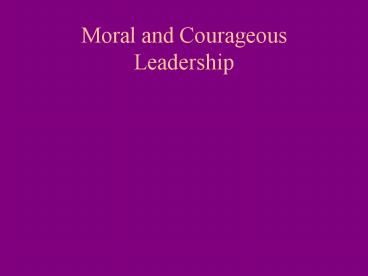Moral and Courageous Leadership - PowerPoint PPT Presentation
1 / 15
Title:
Moral and Courageous Leadership
Description:
What leadership and organizational practices can help us in these matters? ... 'Act only on that maxim by which you can at the same time will that it should ... – PowerPoint PPT presentation
Number of Views:486
Avg rating:3.0/5.0
Title: Moral and Courageous Leadership
1
Moral and Courageous Leadership
2
Issues
- What is ethics?
- What is ethical leadership?
- What are some moral dilemmas we will face in the
work world? - How will we resolve these dilemmas?
- What leadership and organizational practices can
help us in these matters?
3
Ethical Challenges That Students Report
- Describe a situation in which you were faced with
an ethical dilemma. - What was your decision and behavior?
- Are you satisfied with the way you made this
decision? - See results from Providence MBA students (2004)
4
Ethical Approaches
- Utilitarianism or Consequence-based ethics
- Proponents John Stuart Mill and Jeremy Bentham
- The greatest good for the greatest number of
people - The end justifies the means
- Moral consequences moral behavior
- Theory of duties/obligations/rights
- Proponent Immanuel Kant
- Acts should be based on upholding certain
principles - Preserving individual rights and human dignity is
foremost - Kants categorical imperative or the Golden
Rule - Act only on that maxim by which you can at the
same time will that it should become a universal
law
5
Ethical Approaches
- Theory of justice or fairness
- Proponent John Rawls
- Act with fairness and equity towards everyone
- Equal basic liberties should accrue to all
- Inequalities that do exist should benefit the
least advantaged members of society - Due process or procedural justice
- Ethics of care
- Proponent Carol Gilligan
- Consideration is given to preserving caring
relationships - Specific relationships given more particularistic
treatment (parents, friends, family, etc.)
6
Ex. 6.4 Three Levels of Personal Moral Development
Most adults are here
Level 3 Post-conventional Follows internalized
universal principles of justice and right.
Balances concern for self with concern for others
and the common good. Acts in an independent and
ethical manner regardless of expectations of
others.
Level 2 Conventional Lives up to expectations
of others. Fulfills duties and obligations of
social system. Upholds laws.
Level 1 Pre-conventional Follows rules to
avoid punishment. Acts in own interest. Blind
obedience to authority for its own sake.
7
What Typical Moral Dilemmas Do Managers Face?
- Failing to act when one observes unethical
behavior - Carrying out decisions/orders that you clearly
believe are wrong - Acting unethically because everyone else is
doing it - Falsifying data to meet deadlines, quality
standards, avoid extra work, etc. - Reducing safety and quality standards for
products sold in other countries with less strict
laws
8
What Typical Moral Dilemmas Do Managers Face?
- Making phone calls, surfing the internet, playing
computer games, doing personal business on
company time - Lying about being sick or late
- Stealing office supplies for personal use
- Padding expense accounts or stealing monetary
resources from the company - Harassment of other employees, including e-mail
- Failure to walk the talk or the say-do gap
9
The Defining Moment
- What is the defining moment according to
Badaracco? - Who am I? (Issue of moral person)
- Who are we as a group? (Issue of moral
leadership) - Who is the company? (Issue of moral and
responsible company) - Resolving these issues often take soul searching,
courage, and imagination
10
Why Do Managers Bend the Rules?
- 111 executives were surveyed regarding reasons
for breaking company rules - Three common themes emerged
- 1. Performance-based judgment calls
- 2. Faulty rules
- 3. Abiding by socially-embedded norms
From Veiga, J.F., Golden, T.D., Dechant, K.
2004. Why managers bend company rules. Academy
of Management Executive, vol. 18, no.2, pp.
84-89.
11
Five Business Ethics Myths
- Myth 1 Its easy to be ethical
- Myth 2 Unethical behavior in business in simply
the result of bad apples. - Myth 3 Ethics can be managed through formal
ethics codes and programs - Myth 4 Ethical leadership is mostly about
leader integrity - Myth 5 People are less ethical than they used
to be
From Trevino, L.K. Brown, M.E. 2004.
Managing to be ethical Debunking five business
ethics myths. Academy of Management Executive,
vol. 18, no.2, pp. 69-81.
12
Can We Promote Ethical Decision Making and
Behavior Among Managers?
- What obligation do business schools and MBA
programs in particular have to promote ethical
managerial behavior? - What do you think of trying to assess students on
honesty, integrity and ethics as an admission
standard? - What can companies do to promote ethical behavior?
13
Student Ideas for Promoting Ethical Behavior
- Manager must set example of ethical behavior
expected - Give incentives, awards, bonuses, and other
rewards for ethical behavior - Provide punishments, reprimands, and terminations
for unethical behavior - Clearly let employees know about the consequences
of engaging in unethical behavior
14
Student Ideas for Promoting Ethical Behavior
- Have open discussion with employees about what is
considered ethical behavior and expectations for
appropriate behavior - Communicate to employees regarding the importance
of ethics in the workplace - Provide verbal praise and recognition for
engaging in ethical behavior - Promote ethical employees
15
Student Ideas for Promoting Ethical Behavior
- Have clear ethical standards and procedures
- Provide socialization, orientation, and training
programs around ethical issues - Provide employee handbooks specifying ethical and
unethical behaviors - Encourage open communications and feedback from
employees on ethical issues that they see
occurring in the workplace - Provide a feedback mechanism for employees to
report ethical violations they observe































